Toyota Yaris Cross VS VW T-Cross
In the competitively growing subcompact SUV segment, the Toyota Yaris Cross and VW T-Cross stand out for their distinct offerings. The Yaris Cross boasts impressive hybrid efficiency and a rugged design, catering to environmentally conscious buyers seeking adventure. Meanwhile, the T-Cross excels in interior space and advanced technology, appealing to urban drivers looking for practicality without sacrificing style.
Toyota Yaris Cross
The Toyota Yaris Cross combines the practicality of a compact SUV with the agility of a smaller car, making it ideal for urban adventures. Its elevated seating position offers excellent visibility, while the stylish design ensures it stands out on the city streets. Inside, the Yaris Cross boasts a modern interior with advanced technology features designed to enhance the driving experience.
detailsVW T-Cross
The VW T-Cross stands out as a versatile compact SUV that combines practicality with style. Its interior design offers a spacious and flexible layout, ideal for both city driving and weekend adventures. With its modern infotainment system, the T-Cross ensures drivers and passengers stay connected throughout their journeys.
detailsThe Battle of Compact SUVs: Toyota Yaris Cross vs. VW T-Cross
In the ever-evolving world of compact SUVs, two contenders have recently caught the spotlight: the Toyota Yaris Cross and the VW T-Cross. Both vehicles promise a blend of style, practicality, and the latest technology, making them serious contenders for urban drivers and families alike. This comparison will delve into the technical aspects and innovative features of both models to help you decide which SUV suits your needs best.
Design and Dimensions
Starting with design, the Toyota Yaris Cross measures 4180 mm in length, 1765 mm in width, and has a height of 1595 mm. This gives it a commanding presence on the road while ensuring ample headroom within the cabin. In contrast, the VW T-Cross is slightly shorter at 4127 mm but wider at 1784 mm and stands at 1573 mm tall, offering a robust and sporty silhouette. Both vehicles maintain practical dimensions that make them agile in city driving.
Powertrains and Performance
When it comes to performance, the Yaris Cross is powered by a full hybrid engine, available in two outputs: 116 HP and 130 HP, reliant on a 3-cylinder structure. Its impressive fuel consumption figures range from 4.5 to 4.8 L/100km, and it achieves a 0-100 km/h time of 11.2 seconds. The Yaris Cross also features a CVT automatic transmission and has a top speed of 170 km/h.
On the other hand, the VW T-Cross boasts a diverse lineup of petrol engines, ranging from 95 HP to 150 HP, with options for both manual and automatic transmissions. The T-Cross offers a spirited drive with acceleration figures ranging from 8.4 seconds for the 150 HP variant to 11.2 seconds for the base model. Its fuel consumption is slightly higher, ranging from 5.6 to 6 L/100km, and it has a top speed that peaks at 200 km/h for the most powerful variant, showcasing its performance-oriented design.
Interior Comfort and Technology
Inside, the Yaris Cross offers a comfortable five-seat configuration with a trunk capacity of 397 liters, which is impressive for its size. The cabin is designed with the user in mind, incorporating Toyota’s latest infotainment system which includes smartphone integration and advanced safety features.
Meanwhile, the VW T-Cross not only provides a spacious five-seat layout but also boasts a larger trunk capacity of 455 liters, making it highly versatile for families or trips. Its interior technology includes an intuitive infotainment system with a focus on connectivity and driver-assistance features, promoting both comfort and safety.
Efficiency and Environmental Considerations
Fuel efficiency is a significant factor for eco-conscious consumers. The Toyota Yaris Cross stands out with its hybrid technology, resulting in lower CO2 emissions, around 101 to 108 g/km. It falls into the CO2 efficiency class C, emphasizing its commitment to sustainability.
The VW T-Cross, while slightly less efficient with emissions ranging from 127 to 135 g/km, still caters to environmental concerns, registering in the efficiency class D. Its petrol engines offer a balance between performance and practical fuel usage.
Final Verdict: Which SUV Wins?
Ultimately, choosing between the Toyota Yaris Cross and the VW T-Cross boils down to personal preference and priorities. If you are leaning toward sustainability, hybrid technology, and superior fuel efficiency, the Yaris Cross is the ideal option. In contrast, if you desire a sportier drive, more engine choices, and a roomier trunk, the T-Cross deserves your attention.
Both models are impressive in their rights, marrying technology, comfort, and performance—making this comparison a highlight of the compact SUV segment. Whichever you choose, you will be driving a vehicle that embodies the spirit of modern automotive design.
 @ Toyota
@ Toyota
 @ Toyota
@ Toyota
 @ Toyota
@ Toyota
 @ Toyota
@ Toyota
 @ Toyota
@ Toyota
 @ Toyota
@ Toyota
 @ Toyota
@ Toyota
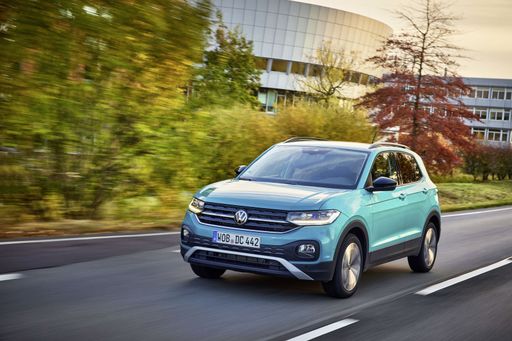 @ Volkswagen
@ Volkswagen
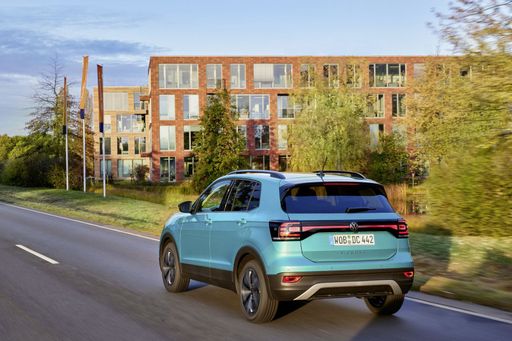 @ Volkswagen
@ Volkswagen
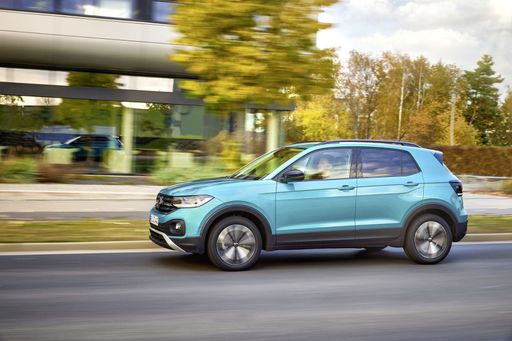 @ Volkswagen
@ Volkswagen
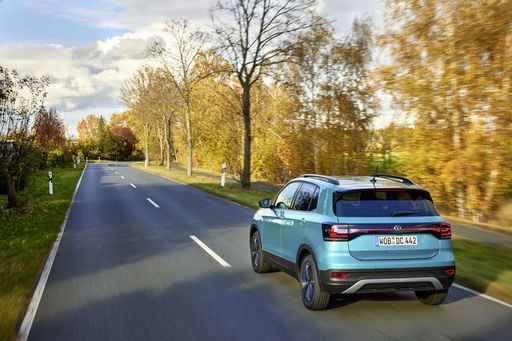 @ Volkswagen
@ Volkswagen
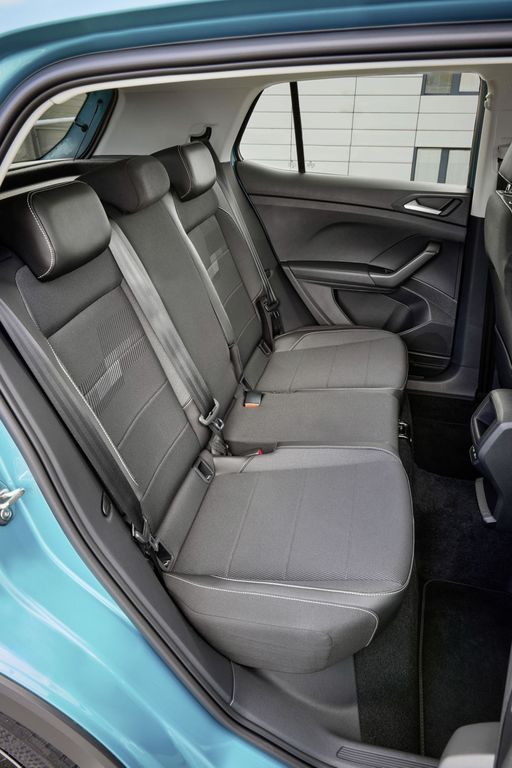 @ Volkswagen
@ Volkswagen
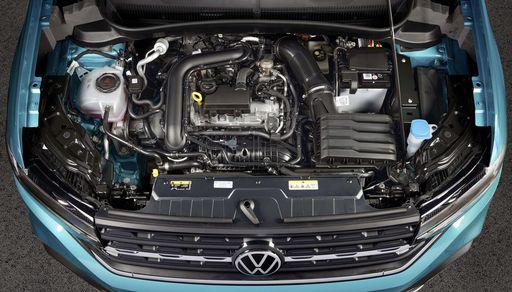 @ Volkswagen
@ Volkswagen

|

|
|
|
|
Costs and Consumption |
|
|---|---|
|
Price
about 24200 - 33900
£
|
Price
about 20900 - 31300
£
|
|
Consumption L/100km
4.5 - 4.8
L
|
Consumption L/100km
5.6 - 6
L
|
|
Consumption kWh/100km
-
|
Consumption kWh/100km
-
|
|
Electric Range
-
|
Electric Range
-
|
|
Battery Capacity
-
|
Battery Capacity
-
|
|
co2
101 - 108
g/km
|
co2
127 - 135
g/km
|
|
Fuel tank capacity
36
L
|
Fuel tank capacity
40
L
|
Dimensions and Body |
|
|
Body Type
SUV
|
Body Type
SUV
|
|
Seats
5
|
Seats
5
|
|
Doors
5
|
Doors
5
|
|
Curb weight
1180 - 1290
kg
|
Curb weight
1254 - 1326
kg
|
|
Trunk capacity
320 - 397
L
|
Trunk capacity
455
L
|
|
Length
4180
mm
|
Length
4127
mm
|
|
Width
1765
mm
|
Width
1784
mm
|
|
Height
1595
mm
|
Height
1573
mm
|
|
Payload
485 - 510
kg
|
Payload
474 - 480
kg
|
Engine and Performance |
|
|
Engine Type
Full Hybrid
|
Engine Type
Petrol
|
|
Transmission
Automatic
|
Transmission
Manuel, Automatic
|
|
Transmission Detail
CVT
|
Transmission Detail
Manual Gearbox, Automat. Schaltgetriebe (Doppelkupplung)
|
|
Drive Type
Front-Wheel Drive
|
Drive Type
Front-Wheel Drive
|
|
Power HP
116 - 130
HP
|
Power HP
95 - 150
HP
|
|
Acceleration 0-100km/h
10.7 - 11.3
s
|
Acceleration 0-100km/h
8.4 - 11.2
s
|
|
Max Speed
170
km/h
|
Max Speed
180 - 200
km/h
|
|
Torque
-
|
Torque
175 - 250
Nm
|
|
Number of Cylinders
3
|
Number of Cylinders
3 - 4
|
|
Power kW
85 - 96
kW
|
Power kW
70 - 110
kW
|
|
Engine capacity
1490
cm3
|
Engine capacity
999 - 1498
cm3
|
|
Top speed
170
km/h
|
Top speed
180 - 200
km/h
|
General |
|
|
Model Year
2024
|
Model Year
2024
|
|
CO2 Efficiency Class
C
|
CO2 Efficiency Class
D
|
|
Brand
Toyota
|
Brand
VW
|
Toyota Yaris Cross
Discovering the Toyota Yaris Cross: The Compact SUV Redefined
The Toyota Yaris Cross has boldly entered the compact SUV market, sporting a blend of sleek aesthetics, advanced hybrid technology, and practical functionality. As urban driving dynamics evolve, this vehicle meets the demands of modern motorists with an impressive performance and eco-friendly technology, setting itself apart in a bustling segment.
Performance and Efficiency: Hybrid Innovation at Its Best
The Yaris Cross is designed to provide an engaging driving experience combined with remarkable efficiency. At its heart lies a full hybrid powertrain, offering options between 116 PS and 130 PS, efficiently paired with Toyota's CVT automatic transmission. The hybrid system seamlessly integrates a petrol engine with an electric motor, optimising power delivery and responsiveness.
Drivers will appreciate the low fuel consumption, which ranges from 4.5 to 4.8 litres per 100 km, and equally impressive CO2 emissions of 101 to 108 g/km, aligning with the industry's ongoing commitment to sustainability.
Design and Dimensions: Compact Yet Spacious
The Yaris Cross offers a perfect blend of compact design and interior spaciousness, making it an ideal choice for urban environments. Measuring 4,180 mm in length, 1,765 mm in width, and 1,595 mm in height, the vehicle manages to provide a refined SUV stature without sacrificing manoeuvrability.
Its five-door layout and flexible boot space, ranging from 320 to 397 litres, make it practical for everything from city commutes to weekend getaways. The increased ride height adds to the SUV appeal, providing drivers with that coveted higher driving position and improved visibility.
Advanced Technology and Features
The Toyota Yaris Cross is well-equipped with an array of technological features, defined by its various trim levels including the Business Edition CVT, Comfort CVT, and the sporty GR Sport CVT. Each model is crafted to cater to diverse consumer needs, whether one prioritises enhanced comfort, sporty aesthetics, or comprehensive safety features.
Key innovations include a state-of-the-art infotainment system, advanced driver assistance features, and the Toyota Safety Sense package that enhances driver confidence through adaptive cruise control, lane keep assist, and more.
Driving Experience: Safety and Comfort in Focus
The Yaris Cross is not just about performance but also ensures safety and comfort for all occupants. The vehicle offers a smooth and quiet ride thanks to its refined suspension system and cleverly designed cabin, reducing noise and vibration levels.
The advanced safety suite within the Yaris Cross, encompassing multiple airbags, stability control, and a host of driver assistance systems, is designed to provide protection and peace of mind, every time you step into the driver's seat.
Conclusion: A New Benchmark in the Compact SUV Segment
The Toyota Yaris Cross stands as a testament to Toyota's commitment to producing environmentally friendly vehicles without compromising on performance or style. It strikes a harmonious balance between innovation, efficiency, and practicality, offering consumers a compact SUV that is both exciting to drive and easy to live with.
As we move further into an era of hybrid advancements and smarter automotive solutions, the Yaris Cross embodies these principles exceptionally, proving to be a robust and reliable partner for the modern driver.
VW T-Cross
The VW T-Cross: A Compact SUV with a Punch
Volkswagen’s T-Cross is stamped as one of the most dynamic models in its segment, combining compact dimensions with versatile features. Designed to bring the SUV experience to an everyday environment, the T-Cross ensures both urban convenience and a robust driving performance. Let's delve deeper into its technical specifications and innovative offerings.
Efficient Powertrains and Performance
Under the hood, the VW T-Cross harnesses efficient powertrains including several petrol engine options, ranging from a modest 95 PS to a more dynamic 150 PS. The model's engine configurations offer either manual or automatic transmission options, coupled with a front-wheel-drive system. These specifications aim to strike a balance between spirited driving and fuel efficiency.
The T-Cross comes with a turbocharged 1.0-litre or 1.5-litre TSI engine, equipped with cylinder deactivation (ACT) technology, enhancing fuel economy and reducing emissions. The engines produce a torque range from 175 to 250 Nm, making everyday driving smooth and responsive.
Fuel Efficiency and Environmental Considerations
The VW T-Cross stands out for its commendable fuel consumption figures, running between 5.6 to 6 litres per 100 km. This classifies it within a respectable CO2 efficiency class D, making it an appealing choice for drivers conscious of both their budgets and environmental footprint. The CO2 emissions range from 127 to 135 g/km, reflecting Volkswagen’s commitment to sustainability.
Design and Utility
Sporting a compact design, the T-Cross measures 4127 mm in length, 1784 mm in width, and 1573 mm in height, offering easy manoeuvrability coupled with an elevated driving position. The SUV hosts a 455-litre boot space, providing ample room for personal belongings or shopping expeditions. Priding itself on practical utility, it can comfortably seat five passengers and supports a maximum load capacity of up to 480 kg.
Comfort and Technology
The T-Cross comes available in various trim levels, such as the GOAL, Life, R-Line, and Style, each offering distinct features tailored to customer preferences. Connectivity and infotainment systems are given priority with the availability of a touchscreen display, ensuring convenience through seamless smartphone integration, navigation systems, and a suite of driver assistance features.
A Conclusion on the VW T-Cross
The VW T-Cross is an embodiment of modern ingenuity within the compact SUV market. It harmonises performance with practicality and presents a modernistic approach to urban driving. Whether you seek efficiency, cutting-edge technology, or ample space to accommodate daily activities, the T-Cross makes a compelling proposition. With a pricing bracket spanning from €24,355 to €36,530, the T-Cross caters to a broad array of budgets while promising a touch of Volkswagen's famed quality and innovation.
